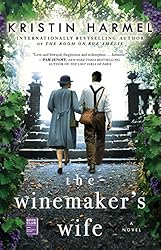The Winemaker's Wife
Gallery Books
432 pp.
ISBN-13: 9781982112301 St. Petersburg Timesampa Bay All SportsPeopleLaura Jones, Argos Community Schs., INThe Winemaker’s WifeThe Winemaker’s Wife
Summary
The author of the engrossing international bestseller The Room on Rue Amelie returns with a moving story set amid the champagne vineyards of France during the darkest days of World War II.
• Champagne, 1940:
Ines has just married Michel, the owner of storied champagne house Maison Chauveau, when the Germans invade. As the danger mounts, Michel turns his back on his marriage to begin hiding munitions for the Résistance.
Ines fears they’ll be exposed, but for Celine, the French-Jewish wife of Chauveau’s chef de cave, the risk is even greater—rumors abound of Jews being shipped east to an unspeakable fate.
When Celine recklessly follows her heart in one desperate bid for happiness, and Ines makes a dangerous mistake with a Nazi collaborator, they risk the lives of those they love—and the vineyard that ties them together.
• New York, 2019:
Recently divorced, Liv Kent is at rock bottom when her feisty, eccentric French grandmother shows up unannounced, insisting on a trip to France. But the older woman has an ulterior motive—and a tragic, decades-old story to share.
When past and present finally collide, Liv finds herself on a road to salvation that leads right to the caves of the Maison Chauveau. (From the publisher.)
Author Bio
• Birth—May 4, 1979
• Born—Newton, Massachesettes, USA
• Education—B.A., University of Florida
• Currently—lives in Orlando, Florida
Kristin Harmel is an American author with more than a dozen novels to her name. Originally from Newton, Massachusetts, she gained her first writing experience at the age of 16 as a sports reporter for the , and T magazine while still attending Northeast High School in St. Petersburg, Florida.
A graduate of the University of Florida, Harmel was a reporter for People magazine starting in 2000. Her work has appeared in dozens of other publications, including Men's Health, Glamour, YM, Teen People, People en Español, Runner's World, American Baby, Every Day With Rachel Ray, and more.
Harmel is the author of more than 10 books, which have been translated into many languages around the world. They include more recently including The Book of Lost Names (2020), The Winemaker’s Wife (2019), The Room on Rue Amelie (2018), and The Sweetness of Forgetting (2012).
Harmel resides in Orlando, Florida with her husband Jason. (Adapted from Wikipedia. Retrieved 4/22/2015.)
Book Reviews
Harmel's engrossing latest reminds us that love, like resistance, begins with courage.
Unfolding in multiple viewpoints, the writing is atmospheric and rich, showcasing heavily researched topics of wine making and French Resistance efforts.… [A]touching story of love and loss in World War II France. —
Library Journal
[Part of the novel's plot] requires suspension of disbelief… [while in others] Harmel resorts to formulaic moments…. A somewhat entertaining but mostly predictable story.… [R]eaders who can't get enough WWII fiction will probably still enjoy it.
Kirkus Reviews
Discussion Questions
1. This novel takes place in the champagne-producing region of France. How does the location play into the plot? Is the setting crucial to the story, or could this book have taken place at any vineyard during World War II?
2. Ines struggles with her place at the Maison Chauveau. She feels disrespected by her husband and left out of everything important. Did you feel sympathy for Ines’s predicament, or were you frustrated by her focus on her own problems? Or a mix of both?
3. Michel is not very attentive to Ines and doesn’t notice her attempts to be useful. However, he pays very close attention to Celine. Why do you think Michel was so frustrated with Inès?
4. Ines looks inward for much of the novel, and as a result, she misses a lot of the horror happening around her. How did you feel about her spending time with a Nazi collaborator? How do you think Ines justified it to herself?
5. Much of revolves around characters being complacent in a time of crisis; therefore, it’s easy for one to be willfully blind to what’s really happening. Are there other times in history where this same observation applies?
6. Liv has her own struggles, including dealing with the end of her marriage. How does her situation compare with Ines’s predicament?
7. Celine goes through an emotional journey over the course of the novel, worrying about her family and her own safety. Her story, sadly, is dictated by the times she lived in. Did you feel satisfied with the way it turned out, or did you want Celine’s story to go differently?
8. Michel feels that he must defy the Nazis in any way he can. How did you feel about his resistance, with his knowing that he was putting others at Maison Chauveau in harm’s way?
9. Ines tries to help the Resistance, but those around her accuse her of only acting, as a way to prove that she’s useful—in essence, for still having selfish motives. How did you separate her motives from her actions? Is there something inherently selfish in every generous act?
10. Discuss what you learned about champagne making in . How much did you know before you read the novel, and what did you learn from it?
11. Harmel surprises the reader with a twist, revealing new truths about modern-day Edith’s identity. Did you suspect that this was the case? Did it impact your understanding of the character of Ines?
12. The selfishness Ines displays has dire consequences at the end of the book. Do you think her work in the Resistance redeemed her?
(Questions issued by the publisher.)


